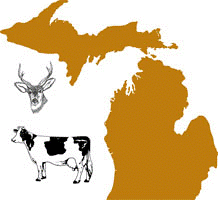Wildlife Disease and Zoonotics

Michigan Bovine Tuberculosis Bibliography and Database
Date of this Version
6-2004
Abstract
On June 9 and 10, 2004, the State of Michigan and U.S. Department of Agriculture hosted the eighth annual Bovine Tuberculosis (TB) Conference, with guest speakers from Georgia, Colorado, Iowa, New York and two Canadian provinces. Our guests came together from across North America to receive policy updates and share the latest scientific data and innovative research on bovine TB.
Among other things, the speakers shared insight on: the promotion of biosecurity; the $30 million annual costs of TB eradication in New Zealand; the latest research in new and improved blood tests; and the first season results of the Michigan Department of Natural Resources pilot project to target and remove only TB positive deer from the “hot” areas in Northeast Lower Michigan.
When the Michigan Bovine TB Eradication Project began in 1996, there was no definitive information on where the disease was, and into what species it had been introduced. Since 1997, the Michigan Department of Community Health has documented 2,284 human TB cases, but only nine were caused by M. bovis, the organism that causes bovine TB. DNR fingerprinting showed that only one of these nine cases had a possible link to exposure to bovine TB infested deer or cattle herd in Lower Northern Michigan. Since testing began, the MDNR has looked at over 123,000 hunter harvested, wild white-tailed deer; and MDA, the USDA and private veterinary practitioners have tested nearly all of the state’s 1 million livestock animals on 17,000 farms. We identified the locations of bovine TB positive cattle and deer and feel confident that we know where the disease occurs.
The dedicated efforts of hunters and livestock producers have led to the long sought-after federal designation of Split State Status. This designation is the first step in acknowledgement from our trading partners that we are headed in the right direction with the ultimate goal of receiving bovine TB free status in all areas of Michigan once again.


Comments
Published in Michigan Bovine Tuberculosis Eradication Project: 2004 Activities Report and Conference Proceedings.